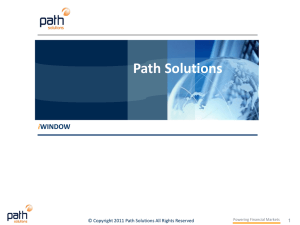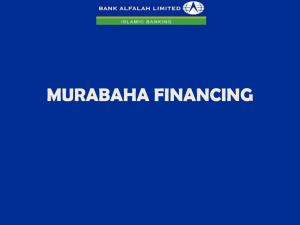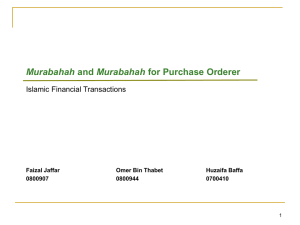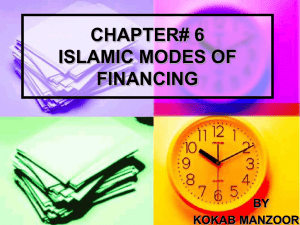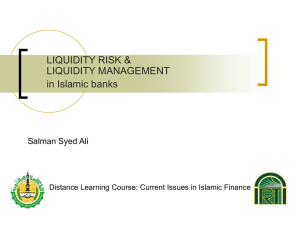Banking Murabaha
advertisement
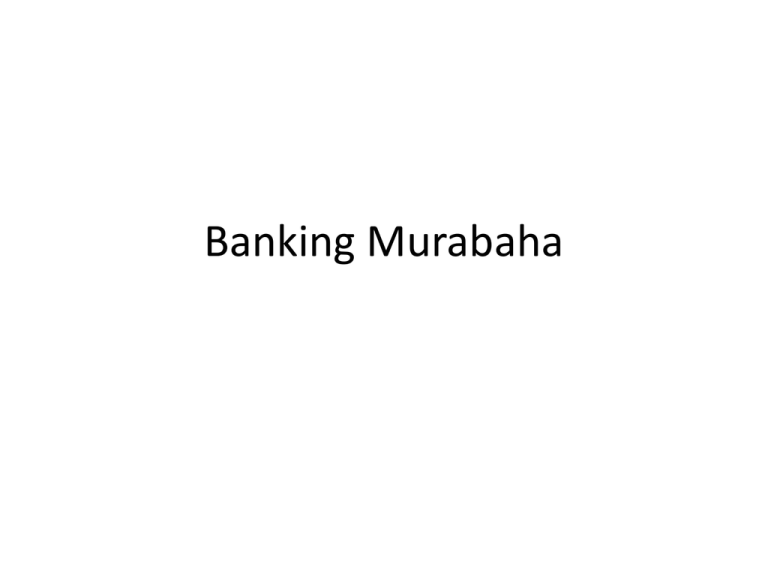
Banking Murabaha BANKING MURABAHA •The product of Murabaha that is being used in Islamic banking as a mode of finance is something different from the Murabaha used in normal trade . • This transaction is concluded with a prior promise to buy, submitted by a person interested in acquiring goods through the institution. 2 BANKING MURABAHA • It is called Murabaha to the purchase orderer . • It is a bunch of contracts completed in steps and ultimately suffices the financial needs of the client. • The sequence of their execution is extremely important to make the transaction Shariah compliant. 3 BANKING MURABAHA It is a contract wherein the institution, upon request by the customer, purchases a asset from the third party usually a supplier/vendor and resells the same to the customer either against immediate payment or on a deferred payment basis. 4 SCOPE OF MURABAHA • As it is a kind of sale, there must be a seller and buyer and some thing that is bought and sold . The institution is the seller and the client is buyer. •It cannot be used as a substitute for running finance facility , which provides cash for fulfilling various needs of the client. 5 SCOPE OF MURABAHA •It is a fixed price sale and normally is done for short term. •The transaction can be used in order to meet the working capital requirements however it cannot be used to meet liquidity requirements. 6 STAGES OF MURABAHA 1. Promise Stage 2. Agency Stage 3. Acquiring Possession 4. Execution of Murabaha 5. After Execution of Murabaha 7 STAGES OF MURABAHA PRIOMISE STAGE 8 CREDIT APPROVAL (under Shariah perspective) Points to Be Considered While Approving Credit •It is essential that the transaction between two parties must be genuine , not fictitious and should exclude any prior contractual relationship between the customer and original supplier . •It is not permissible to transfer a contract that has been executed before between client and supplier. However revocation of prior contract between the supplier and the client can allow the institution to enter in Murabaha 9 CREDIT APPROVAL (under Shariah perspective) Points to Be Considered While Approving Credit •The Institution must ensure that the party from whom the item is bought is a third party and not the customer or his agent . In this manner the transaction can be saved from Bai Inah (Buy Back) which is not allowed in sharia. 10 Continues.. • The Client orders the institution to buy certain goods for him and sell him the same after acquiring. The prerequisite is that the goods are not already owned by the client. •At this stage the customer promises the institution to buy the goods which were acquired by the institute on his request. 11 STAGES OF MURABAHA 2. AGENCY STAGE 12 AGENCY STAGE • Agency Agreement is not the condition of the Murabaha if the institution can make direct purchases from the supplier. • The financial institution, does not have the expertise to identify the goods and negotiate an efficient price. • The customer, however, being in the industry, can do this. • The institution therefore appoints him as its Agent (which is also permissible), in the first step of the transaction, to identify and procure the goods on institution behalf. 13 AGENCY STAGE •This is done by execution of Agency Agreement between the institution and the customer. •However according to Shariah Perspective it is preferable to appoint the Agent other than customer. •If goods are acquired from third party the execution of agency agreement will be between the institution & the third party. 14 AGENCY STAGE TYPES OF AGENCY AGREEMENT 1. GLOBAL AGENCY AGREEMENT When the purchase of commodity is not of consistent nature. 2. SPECIFIC AGENCY AGREEMENT When the purchase of commodity is of consistent nature. 15 STAGES OF MURABAHA 3. ACQUIRING POSSESION 16 ACQUIRING POSSESION •Advance payment can be made to the supplier. •DISCOUNT ON ACQUISITION OF ASSETS Discounts from supplier (If any) would be passed on to the customer at the time of Murabaha Sale by reducing the cost of sales. 17 Continues.. •Change of commodity in the agency agreement can be done with mutual consent. •Delay in Supply from the Supplier. Delay in Supply from the supplier in case where specific time was allowed leads to the revocation of agency agreement. In such cases the customer will refund the cost of goods. 18 Continues.. •Rejection On Ground Of Quality •If the customer rejects the goods on ground of inferior quality before the execution of Murabaha, new quality can be acquired through new Murabaha. After execution of Murabaha the bank will not be liable for any discrepancies. 19 Acquisition Of Title & Possession The Asset Of • Institution must take possession of the item. • The forms of taking delivery or possession of items differ according to their nature and customs. • The item must move from the responsibility of the supplier to the responsibility of the institution. • It is obligatory that the point when the risk of the item is passed on by the institution to the customer, be clearly identified. actual or constructive 20 ACQUIRING POSSESION Importance of Physical Inspection Registration is in the name of institution for those items where registration is required. 21 STAGES OF MURABAHA 4. EXECUTION OF MURABAHA 22 EXECUTION OF MURABAHA • Customer, as an Agent, confirms that goods have been purchased & same are in his possession and that payment has been made to the supplier. • Customer makes an offer to purchase the goods from the institution. • Institution accepts the offer by stating the Cost price plus amount of Profit and the due date for Payment by which sale is concluded. 23 Continues.. • At this stage, relation of a buyer & seller comes into operation between the institution & the client, & since the sale is effected on deferred payment basis, the relation of debtor and creditor also emerges between them simultaneously. • Customer having received delivery of Goods as per Purchase Requisition confirms that goods have been examined and are satisfactory in respect of quality and suitability for his use. • The customer also releases the institution from any risk / liability in respect of the goods in any manner. 24 AFTER EXECUTION OF MURABAHA Securities Against Murabaha Price • The institution may ask the customer to furnish a security to its satisfaction for prompt payment of the deferred price. • However, it is also permissible that the customer furnishes a security at earlier stages but after the Murabaha price is determined. • It is also permissible that the sole commodity itself is given to the seller as a security. • It is preferable not to take Interest bearing instruments as securities. 25 AFTER EXECUTION OF MURABAHA In Case Of Default: • In the case of default by the buyer in the payment of price at the due date, the price cannot be increased. • However if he has undertaken, in the agreement to pay certain amount for a charitable purpose, he shall be liable to pay the amount undertaken by him. • But this recovered amount from the buyer will not be considered penalty nor compensation, therefore it will not account to institutions income. • Institution is bound to spend it for a charitable purpose on behalf of the buyer. 26 ISSUES IN MURABAHA Rebate in Early Payment •If the customer makes early payment and there is no commitment from the institution in respect of any discount in the price of Murabaha, than the institution has the sole discretion in allowing them the rebate. Rollover in Murabaha •Rescheduling is allowed but repricing is not allowed. •Rollover is also not allowed. 27 Murabaha Step by step Murabaha financing 1. Client and bank sign an agreement to enter into Murabaha. Islamic Bank Agreement to Murabaha Client 28 Murabaha Step by step Murabaha financing 2. Client appointed as agent to purchase goods on bank’s behalf Bank Agreement to Murabaha Agency Client Agreement 29 Murabaha Step by step Murabaha financing 3. Bank gives money to client for purchase of goods. Islamic Bank Bank Agreement to Murabaha Client Agency Agreement Disbursement to the client 30 Murabaha GENERAL MECHANICS VENDOR ISLAMIC BANK Agreement CUSTOMER • The customer approaches the Bank with the request for financing. • The Bank purchases and receives title of ownership from the vendor. • The Bank makes payment to the vendor. • The Bank transfers the title over to the customer upon payment. • The customer makes payment up-front or on a deferred basis 31 VARIOUS MODELS OF MURABAHA FINANCE 32 MODEL - I TWO PARTY REALTIONSHIP • Bank – Customer MODEL - II THREE PARTY RELATIONSHIP • (Bank-Vendor) and Customer MODEL - III THREE PARTY RELATIONSHIP • Bank and (Vendor-Customer) 33 MODEL - I • The simplest possible model emerges when the transaction involves two parties only, i.e. Bank and the Customer. • The Bank is also vendor and sells the Asset(s) to its Customers on deferred payment basis. • From Shariah perspective it is an ideal Model and its profits are fully justified because Bank assumes all risks as Vendor/Trader. 34 MODEL I – GRAPHICAL PRESENTATION 2 Customer 1 3 35 Bank/Vendor MODEL I - PHASES Phase 1: The customer approaches Bank (Vendor) and identifies Asset(s) and collects relevant information including cost and profit. Phase 2: Bank sells Asset(s) to the Customer, transfer risk and ownership to the Customer at certain Murabaha Price. Phase 3: Customer pays Murabaha Price in lump sum or in installments on agreed dates. 36 MODEL - II • In most cases Murabaha Transaction involves a third party (i.e. Vendor) because Bank is not expected to engage in sale of variety of products required for variety of Customers. • The Bank directly deals with the Vendor and purchases the Asset(s). 37 MODEL II • The Bank sells the purchased Asset(s) to the customer on cost plus Profit basis. • There are two distinct sale contracts at different point of times. First between Bank and Vendor and second between Bank and the Customer. 38 MODEL II – GRAPHICAL PRESENTATION 1 Customer Vendor 5 2 6 39 3 4 Bank MODEL II - PHASES Phase 1: Customer identifies and approaches the Vendor or Supplier of the Asset(s) and collects all relevant information. Phase 2: Customer approaches the Bank for Murabaha Financing and promises to buy the Asset(s). Phase 3: The Bank makes payment to vendor directly. 40 MODEL II – PHASES Phase 4: Vendor delivers the Asset(s) & transfers the ownership of Asset(s) to the Bank. Phase 5: Bank sells the Asset(s) to Customer on cost plus basis and transfers ownership. Phase 6: 41 Customer pays Murabaha Price in lump sum or in installments on agreed dates. MODEL III – BANKING MURABAHA • This Murabaha Model is mostly practiced model in Banking now a days and therefore we will look at it in more detail. • We will also look at the documentation required at different stages of the transaction. • It is also a three-party structure but it is bit complicated than previous ones. 42 MODEL III – BANKING MURABAHA • It is a bunch of contracts completed in steps and ultimately suffices the financial needs of the client. • THE SEQUENCE OF THEIR EXECUTION IS EXTREMELY IMPORTANT TO MAKE THE TRANSACTION SHARIA’H COMPLIANT. 43 MODEL III – GRAPHICAL PRESENTAION 3 Vendor 4 5 5 2 Bank Customer 6 Offer Acceptance 1 44 7 PHASE I – PROMISE TO PURCHASE AND SELL • • 45 The Customer approaches the Bank for Murabaha Finance and promises to purchase the Asset(s) from the Bank which, the Customer will purchase as an Agent of the Bank. Master Murabaha Finance Agreement (MMFA) shall be signed by the Bank and the Customer at this stage. This is basically a Memorandum of Understanding between two parties. PHASE II – APPOINTMENT OF AGENT • In the absence of expertise required to purchase particular kind of Asset(s), the Bank appoints Customer as its Agent to buy Asset(s) on its behalf • Types of Agency Agreement 46 ON ASSET BASIS ON TIME BASIS •Global Agency •Specific Agency •Limited Period •Open Ended PHASE II – APPOINTMENT OF AGENT • The appointment of an Agent for purchase of Asset(s) for and on behalf of the Bank and the ultimate sale of such Asset(s) to the Customer shall be independent transactions of each other and separately documented. • However, according to Sharia’h perspective, it is preferable to appoint the Agent other than the Customer. 47 PHASE II – APPOINTMENT OF AGENT • Agency Agreement is not the condition of the Murabaha if the institution can make direct purchases from the supplier. • It is advisable to execute Agency Agreement because financial institution does not have the expertise to identify the Asset(s) and negotiate an efficient price. 48 PHASE II – DOCUMENTATION AGENCY AGREEMENT • This agreement must contain: Types (Global/Specific) Description of Asset(s) to be purchased Mode of Disbursement of Funds Roles and Responsibilities of Agent • THESE DOCUMENTS MUST BE SIGNED BEFORE PURCAHSE OF ASSET(S) BY THE AGENT 49 PHASE III & IV – PURCHAHSE OF ASSETS BY AGENT • The Customer identifies the Vendor, selects the Asset(s) on behalf of the Bank and advice its particulars, including the Vendor’s name and purchase price to the Bank. • If the supplier is nominated by the Customer itself, guarantee for good performance can be demanded from the Customer. 50 PHASE III & IV – PURCHAHSE OF ASSETS BY AGENT • The Customer takes possession of the Asset(s) as an Agent of the Bank. • It is the obligation of the Customer(Agent) to ensure, at this stage, that Asset(s) supplied is in accordance with the given specifications. • To ensure that a fresh Asset(s) are purchased by the Agent, Bank’s staff should verify actual purchase of Asset(s). 51 PHASE III & IV–DOCUMENTATION DECLARATION FROM CUSTOMER (AGENT) • The Customer (Agent) will inform the Bank, through this document, that it has taken the possession of Asset(s) on behalf of the Bank. • This Transactional Document shall be an integral part of Master Murabaha Financing Agreement (MMFA). • This declaration must contain the statement that Customer has inspected the Asset(s) to ensure its appropriateness and suitability to the customer. 52 Phase V DISBURSEMENT OF FUNDS / PAYMENT TO VENDOR • The Bank has two options regarding for payment of Purchase Price of Asset(s) bought by Agent on its behalf. a) Direct payment to Vendor by the Bank (preferable). b) Disbursement of Funds to Agent’s (Customer’s) account for onward payment to Vendor through Cross Cheque/Pay Order/Demand Draft etc. 53 PHASE V - DOCUMENTATION LETTER OF DISBURSEMENT • This document is requested from the Customer to disburse funds for payment to Vendor. 54 • The disbursement of funds to the Customer shall be treated as “Advance Against Murabaha”. PHASE VI MURABAHA EXECUTION STAGE (OFFER AND ACCEPTANCE) • The Customer offers to buy the Asset(s) from the Bank which it has purchased as an Agent of the Bank. • The Bank gives the Acceptance to the Customer’s Offer. • THIS IS THE POINT WHERE THE MURABAHA COMES IN TO EXISTENCE. 55 PHASE VI Murabaha Execution Stage (Offer And Acceptance) • It is obligatory that the point when the risk of the Asset(s) is passed on by the Bank to the customer be clearly identified. • It is mandatory to determine the Murabaha Price at this stage, otherwise Murabaha shall not be valid. • It is also mandatory to determine the date of payment of Murabaha Price rendering the Murabaha to be valid. 56 PHASE VI MURABAHA EXECUTION STAGE DOCUMENTATION a) OFFER FOR PURCHASE • The Customer offers to buy the Asset(s) purchased by it as an Agent. • This documents should be signed after actual possession of Asset(s) by the Customer but before consumption of such Asset(s). • This Transactional Document shall be an integral part of Master Murabaha Financing Agreement (MMFA). 57 PHASE VI MURABAHA EXECUTION STAGE DOCUMENTATION b) BANK’S ACCEPTANCE OF OFFER • Bank accepts the Customer’s offer and sells the Asset(s) purchased by Customer(Agent) on its behalf on Murabaha Price to be paid on agreed future date. • The Asset(s) must be in Bank’s possession by either way, i.e. physical or constructive. 58 PHASE VI MURABAHA EXECUTION STAGE DOCUMENTATION • This document must contain i. Murabaha Price (Cost+Profit) ii. Repayment Date 59 PHASE VI MURABAHA EXECUTION STAGE DOCUMENTATION c) PAYMENT SHEDULE SUMMARY • The customer has three options to pay the Murabaha Price. i. Lump-sum payment ii. Installment Payment iii. Partly instant and partly in installment • 60 This documents is required if the Customer wishes to pay the Murabaha Price in installments PHASE VI MURABAHA EXECUTION STAGE DOCUMENTATION d. DEMAND PROMISSORY NOTE • After execution of Murabaha, the Murabaha Price will become the Debt (Dyan) on the Customer. • This document is Customer’s acknowledgement to the debt amount and its promise to pay the debt. 61 PHASE VII PAYMENT OF MURABAHA PRICE BY CUSTOMER • Customer will pay the Murabaha Price to the Bank on the agreed date. • The customer is not entitled to any reduction in Murabaha price in case of early payment of Murabaha Price. • In same way Bank can not increase the Murabaha Price if the Customer defaults or make delayed payment. 62 SECURITIES IN MURABAHA • The institution may ask the customer to furnish a security to its satisfaction for prompt payment of the Deferred Murabaha price. • It is also permissible that the sold Asset(s) itself is given to the seller as a security. • It is preferable not to take Interest bearing instruments as securities. 63 SECURITIES IN MURABAHA • Bank can obtain any of the following security from its Customer client depending upon the nature of credit facility, amount of facility and credibility of the customer. 64 HYPOTHECATION OF ASSETS PLEDGE OF GOODS AND/OR MARKETABLE SECURITIES. LIEN ON DEPOSITS. MORTGAGE ON IMMOVABLE PROPERTIES. BANK GUARANTEES. PERSONEL GUARANTEES. MURABAHA IN FOREIGN TRADE Murabaha Import Murabaha Export Murabaha Pre-shipment 65 Post-shipment USE OF MURABAHA IN IMPORTS • Agency Agreement must be signed before opening of L/C in case of imports. • All costs/charges (e.g. SWIFT charges, L/C Opening commission) shall be included in the cost of Murabaha Asset. • Offer and Acceptance may be signed when the Asset(s) arrived at port. • In case of Usance L/C, Murabaha execution stage is “offer and Acceptance stage” even though the payment is made after usance period. 66 USE OF MURABAHA IN EXPORTS • In case of Pre-shipment, normal procedure as adopted in local Murabaha shall be strictly followed. • In case of post-shipment, Murabaha can not be executed for goods already exported. However, Murabaha can be executed for fresh purchases required for next shipment against assignment of receivables for first shipment. 67 PRACTICAL ISSUES IN MURABAHA 68 Discount On Acquisition Of Assets • Discounts from supplier (If any) would be passed on to the customer at the time of Murabaha Sale by reducing the cost of sales. 69 Gap Between Declaration and Receipts • In certain transactions banks receive declaration of the purchased goods after significant delay. So there is risk that goods might already have been used/sold by the customer. • Murabaha transaction should be executed as soon the goods purchased by the customer. • Gap between Disbursement and Declaration. 70 D.P NOTE • D.P Note Shall be signed from Customer After Declaration. • Amount of Declaration and Amount of D.P Note shall be same. 71 Risk Management IN MURABAHA 72 Legal and Shari’a Risks • Legal and Shari’a compliance risk • Completeness of Legal documentation for various contracts • Adherence to AAOIFI Shari’s standards • Role of Shari’a supervisory boards/ advisers in mitigating Shari’a risk • Mis-timing in signing of Commodity Murabaha contracts can lead to lost income 73 Risk In Murabaha • Title to assets transferred to the customer at the time of purchase • Usually the customer then provides same or other assets as collateral. • Role of purchasing department is essential while customer is taking from various institutions banking Murabaha facility. 74 End of Presentation Thank you for your attention

